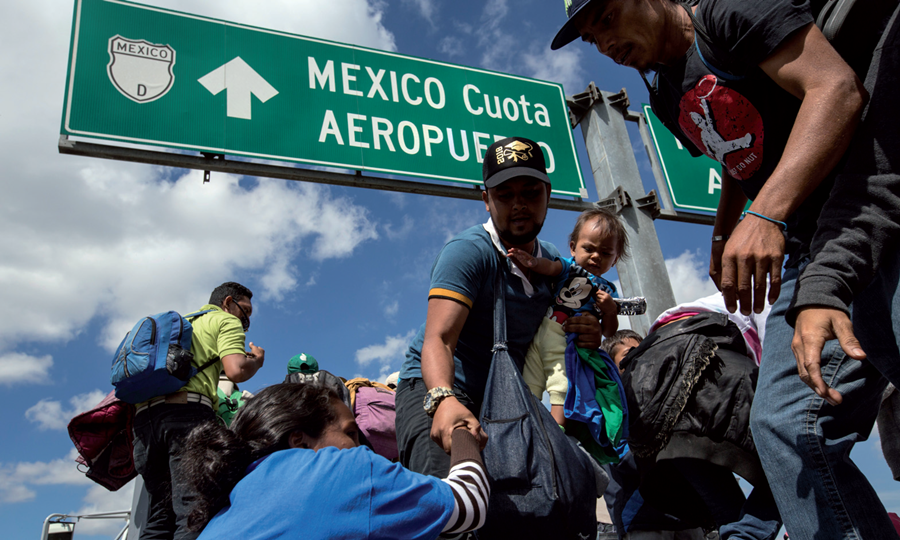Migrant caravan reaches Mexico City


MEXICO CITY — Thousands of Central American migrants traveling in a caravan arrived in the Mexican capital Monday and began to fill up a sports stadium, still hundreds of miles from their goal of reaching the US a day before midterm elections in which President Donald Trump has made their journey a central campaign issue.
By afternoon, 2,000 or more had arrived at the Jesus Martinez stadium, which has a capacity of about three times that, and eagerly began sifting through donations of clothes, gave themselves sponge baths, lunched on chicken and rice under the shade of tents and picked up thin mattresses to hunker down for the night.
Many went to medical tents to get treatment for blistered and aching feet, illnesses and other ailments. "Since we got here, we have not stopped," said Tania Escobar, a nurse with Mexico City's public health department.
Melvin Figueroa, a 32-year-old from Tegucigalpa, Honduras, was traveling with his pregnant wife and two children, 6 and 8. He brought the 6-year-old girl to the tent because her eyes were irritated and "she throws up everything she eats."
Several thousand more migrants were trudging along the highway between the city of Puebla and the capital, catching lifts from passing vehicles when possible.
Nashieli Ramirez, ombudsman for the city's human rights commission, said the city was preparing to accommodate as many as 5,000 migrants from the lead caravan and several smaller ones hundreds of miles behind it, for as long as necessary.
"We have the space in terms of humanitarian help," Ramirez said.
In dozens of interviews since the caravan set out from Honduras more than three weeks ago, migrants have said they are fleeing rampant poverty and violence. Many are families traveling with small children. Some say they hope to work, secure a good education for their children and send money to support loved ones back home.
Alba Zoleida Gonzalez, 48, from Valle, Honduras, said she had walked for five hours and hitched a ride on a tractor-trailer with about 150 people. Her calf muscles were aching, but that was a small price to pay for the chance at a life better than the one back home.
"I looked for work, and nothing," Gonzalez said, adding that her husband had been robbed and had to hand over everything he made selling crabs so his assailants wouldn't do worse. "And when one does find a little job they kill you for the money," she said.
Arriving in Mexico City, some migrants stopped at the Basilica of Our Lady of Guadalupe, a major pilgrimage site, to thank the Virgin Mary for watching over them during their journey.
Many had struck out ahead of the larger caravan but intended to regroup in the capital. Oscar Ulloa, 20, an accountant from Honduras, said he arrived by bus from Puebla thanks to handouts from Mexicans. He expected the group would assemble and vote in the coming days on their next moves.
The 178-mile trek (286 kilometers) Monday from the Gulf state of Veracruz to Mexico City was the longest single-day journey for the group of about 4,000 migrants.
But there were obstacles on this latest stretch.
Truck after truck denied the migrants rides as they trudged along the highway into the relatively colder November temperatures of central highland Mexico.
At a toll booth near Fortin, Veracruz, Rafael Leyva, an unemployed cobbler from Honduras, stood with a few hundred others for more than 45 minutes without finding a ride.
Migrants converged on tractor trailers, forcing the big rigs to stop so they could climb aboard. Such impromptu hitchhiking is precarious with dozens scrambling onto vehicles at a time.
Mexico City is more than 600 miles from the nearest U.S. border crossing at McAllen, Texas, and a previous caravan in the spring opted for a much longer route to Tijuana in the far northwest, across from San Diego.
That caravan steadily dwindled to only about 200 people by the time it reached the border.
AP































